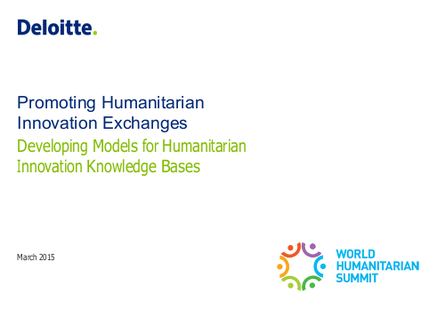
• Humanitarian crises occur with distressing regularity, creating needs for assistance that are growing in scope and scale • To effectively address these challenges given resource constraints, humanitarian actors increasingly recognize the need for innovation in the sector • Key bottlenecks to innovation in the humanitarian space are: – A lack of consensus on “what works” and an inability to compare new solutions and practices – Insufficient processes, infrastructure, tools, and talent to identify, support, validate, and disseminate innovations
• To address these innovation bottlenecks, the humanitarian sector should take a holistic view of the components that foster or inhibit the identification and spread of effective innovation and examine their interactions and dependencies to design appropriate solutions • An innovation knowledge base (IKB) – the ecosystem of players, processes, technologies that enable valid comparisons about what works and create incentives and governance mechanisms to act on and adopt that innovative knowledge – can be designed to take this comprehensive view to facilitate innovation • By applying this holistic lens to the humanitarian space and exploring the IKBs in analogous sectors, we can create IKB models that are customized to the humanitarian context and provide a range of potential solutions to stimulate and sustain innovation in the sector
• Our objectives are to: 1. Articulate distinct IKB models, drawing from analogous sectors, to spur innovation in the humanitarian sector 2. Enable the field to have an extended conversation about what IKB is most appropriate and to design a hybrid IKB best suited to the unique needs of the sector • We examined case studies in five analogous sectors (military, healthcare, construction, technology, and academia/engineering) to identify core success factors of IKBs that could be applicable to the humanitarian sector • Findings from our case studies led to three generic IKB models – Research-Oriented, Solution-Driven, and Experiential – that were found to successfully stimulate innovation knowledge sharing and adoption • We explored the unique contextual characteristics and challenges faced by the humanitarian sector to identify core barriers to innovation in the humanitarian system to best tailor these generic models to the humanitarian context • Three tailored IKB models – Research Navigator, Solution Mobilizer, and Experience-Based Validator – were formed customized to the humanitarian context • Finally, we drew inferences from each model to identify specific tradeoffs that could be used as building blocks to design a hybrid IKB